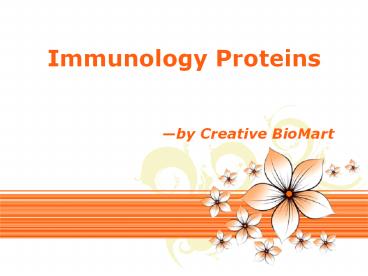Immunology Proteins - PowerPoint PPT Presentation
Title:
Immunology Proteins
Description:
Immunology Proteins – PowerPoint PPT presentation
Number of Views:155
Slides: 7
Provided by:
Username withheld or not provided
Category:
Medicine, Science & Technology
Tags:
Title: Immunology Proteins
1
Immunology Proteins
by Creative BioMart
2
Immunology is a broad branch of biomedical
science that covers the study of all aspects of
the immune system in all organisms. It deals with
the physiological functioning of the immune
system in states of both health and disease
malfunctions of the immune system in
immunological disorders (autoimmune diseases,
hypersensitivities, immune deficiency, transplant
rejection) the physical, chemical and
physiological characteristics of the components
of the immune system in vitro, in situ, and in
vivo. Immunology has applications in several
disciplines of science, and as such is further
divided.
3
Immune System Diseases Protein
The immune system is a highly developed system,
consisting of complex components such as lymph,
or lymphatic, organs like spleen and thymus and
several kinds of immune system cells. The
function of immune system is to find and kill
invaders, including cancer cells. However, once
your immune system doesn't function the way
normally, it is called an immune system disorder
and may reduce some diseases. There are several
types of immune system disease Primary immune
deficiency, in this case, one person is born with
a weak immune system. Acquired immune deficiency,
in this case, a disease weakens your immune
system. The most famous are AIDS caused by HIV
infection.
4
Immunoglobulins Protein
Immunoglobulin, also known as antibody, is large,
Y-shape glycoprotein molecules produced by plasma
cells in identification and response to an
immunogen such as bacteria and viruses.
Immunoglobulin or antibodies play vital roles in
immune defenses. Without medical intervention,
individuals born with antibody deficiencies
succumb to infections and die early in life. Even
before the adaptive immune system has developed
and produced antibodies of its own, fetuses and
infants receive protection from maternal
antibodies transferred across the placenta. At
mucosal surfaces, antibodies are important for
blocking the initial entry of bacteria and
viruses into the body. If such a barrier is
bypassed, then antibodies are employed in
systemic defense. In addition to their role in
killing pathogens and neutralizing viruses and
toxins, antibodies coordinate the immune response
by acting as adaptor molecules that bring
antigens together with cells and proteins of the
innate immune system. These interactions are made
possible by the unique structure of antibodies.
5
Innate Immunity Protein
The immunity of more complex organisms is
distinguished by the development of a proper
immune system consisting of specialized cells and
tissues dedicated to controlling pathogens,
toxins and malignancies. In the lower organisms
these defenses are limited to innate immunity,
which is established prior to the encounter with
a pathogen and does not require education of the
immune system to function. Innate immunity has
been highly conserved throughout evolution, and
entails specialized cells and molecules that
recognize and target foreign structural
components common to different classes of
pathogens. For example, toll-like receptors are
molecules expressed by cells to detect pathogen
components, such as bacterial cell wall molecules
and DNA, and are found in species from insects to
vertebrates.
6
Contact Creative BioMart Address 45-1 Ramsey
Road Shirley, NY 11967, USA Email
contact_at_creative-biomart.com Website
http//www.creativebiomart.net/researcharea-innate
-immunity-proteins_83.htm































![[PDF] The Beautiful Cure: The Revolution in Immunology and What It Means for Your Health Hardcover – September 28, 2018 Kindle PowerPoint PPT Presentation](https://s3.amazonaws.com/images.powershow.com/10104645.th0.jpg?_=202408220112)